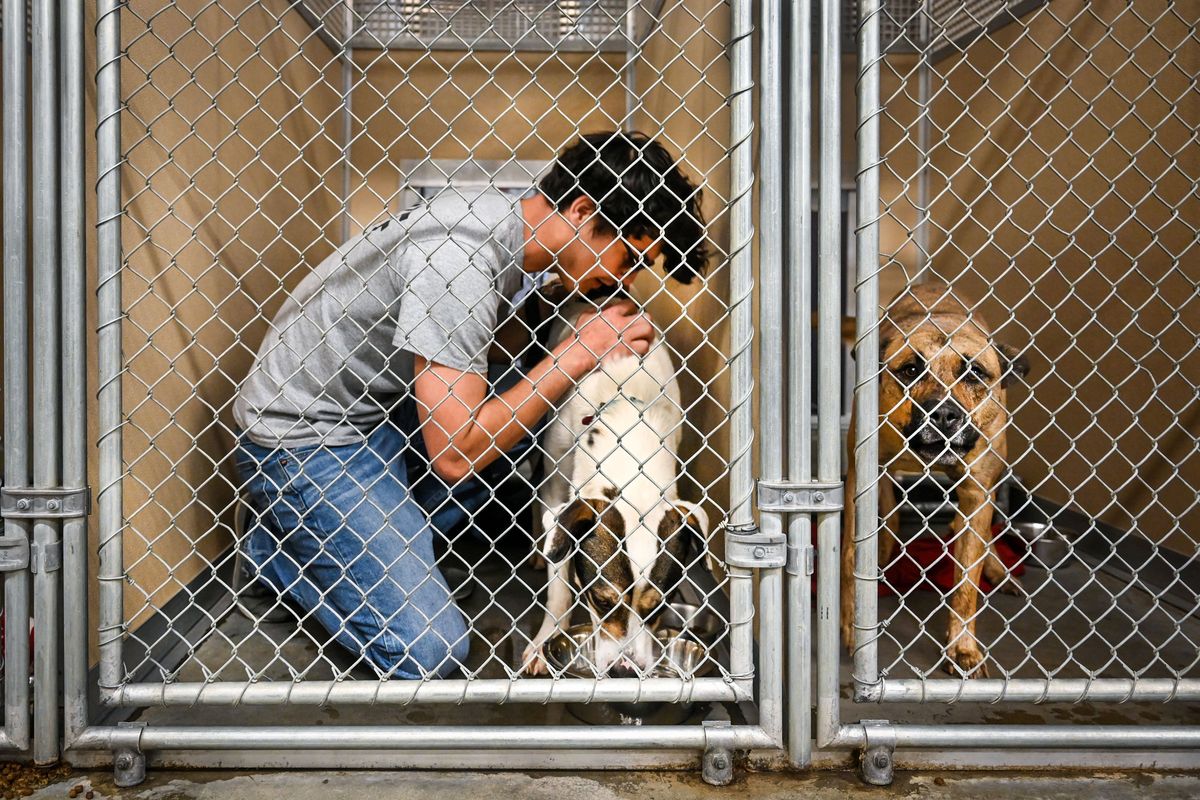SpokAnimal dealing with glut of large dogs, which shelter says is consequence of tight housing market

Animal surrender calls are coming in three to four times a day to the SpokAnimal shelter, when this time last year those calls only came three to five times a week
A housing crisis among people is causing another housing crisis for pets.
Animal rescue nonprofit SpokAnimal C.A.R.E. in central Spokane is receiving about the same number of surrender calls a day that it was in a week last year, and officials believe lack of housing is to blame.
“We’re having a huge influx of owner surrenders,” Dori Peck, executive director of SpokAnimal, said.
The shelter has recently become overfilled with animals, mostly larger dogs that are more expensive to care for. People aren’t able to keep their pets because they can’t afford rising pet deposits needed to rent apartments or homes, and the lack of affordable housing in Spokane is forcing owners to give up their pets, Peck said.
The cost of housing has spiked, with some people even experiencing doubling of rent rates, said Terri Anderson the Spokane director of the Tenants Union of Washington State. “Unfortunately pets seem to be affected by people problems,” Anderson said.
Anderson fears that the increase in animal surrenders also could be due to tenants not knowing their rights under the Americans with Disabilities Act. Many people with emotional support animals are giving up their animals when they are getting these notices from their rentals that their pets are not allowed, when in actuality they may be legally allowed to keep their pets.
“Never have we gotten this many calls of people having to move and give up their pets and livelihoods,” Anderson said.
Anderson said more tenant education is needed so people don’t give up what they don’t have to. That could include contacting the Northwest Fair Housing Alliance.
“I worry about tenants who don’t know what the laws are,” Anderson said.
Meanwhile, the list of people requesting help in surrendering their pets continues to grow, Peck said.
“A lot of it is the housing crisis, people just can’t move with these large dogs. If they have to move back in with friends and family there just isn’t room for them,” Peck said.
The shelter’s 31 dog kennels are all filled with large dogs, and even with partnerships with both PetSmart and Petco, the shelter still does not have enough room for all the surrendered animals.
Peck said that many landlords ban larger dog breeds, forcing owners to choose a place to live over their beloved pets.
Shelters like SpokAnimal have to put animals in waiting areas as there is nowhere else for them to go. Larger dogs like pit bulls, German shepherds, huskies and Rottweilers are the animals surrendered the most, as they exceed the weight limit at most rentals.
Peck suggests people let SpokAnimal know in advance if they need to give up their pet so they can prepare to make room for them in the shelter. In emergencies, the shelter will accept animals without prior notification, she said.
SpokAnimal provides a food bank for the public, so if someone is struggling to feed their pet they can come in and grab free pet food.
Peck says that their food bank is seeing more use per week than she’s seen in the eight years she’s been with SpokAnimal. They need more food donations to continue supporting the community and the people struggling to provide for their animals.
“Everything that is donated to us, we share with our community,” Peck said.
Partnerships with businesses like PetSmart and Kitty Cantina help by boosting attention to adoptable pets and increasing capacity for shelters, Peck said. Kitty Cantina, 6704 N. Nevada St., is a cat cafe that allows customers to socialize with adoptable felines from SpokAnimal, and PetSmart has areas for customers to meet adoptable cats and dogs from the shelter.
What citizens can do to help the most is to become a foster family for these animals, Peck said.
“We need more foster families to step up. That’s what saves lives because we’re able to bring other animals into the shelter,” Peck said.
Bigger dogs need more time to get picked up. While waiting, there’s lots the community can do to help not only to get these dogs adopted but also by helping other community members who are struggling through donations, volunteering, fostering and even just spreading the word about adoption events.
“If you wanna help with the stores, if you want to walk dogs, work in our thrift store, there’s all kinds of stuff to do,” Peck said. “We always appreciate donations.”